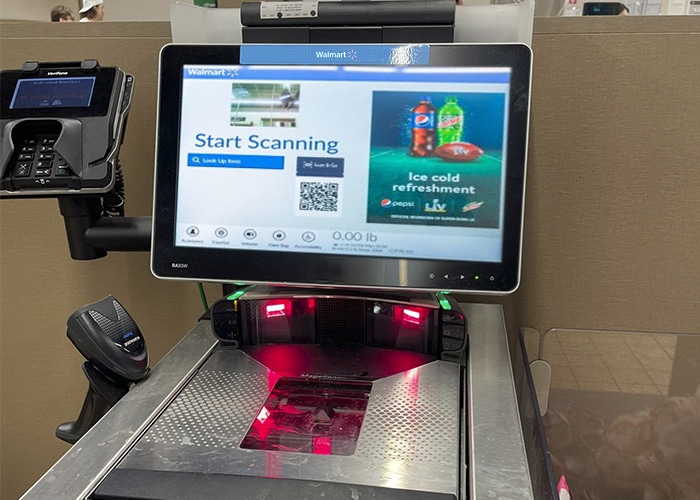Walmart is in hot water after starting to introduce its latest-tech self-checkout stations, sparkling controversy. It is an advanced system that aims to prevent small-scale thefts, which leave retail chains hundreds of millions of dollars in losses every year. But, everything indicates that Walmart took this control attempt too far by installing self-checkout pay stations with allegedly excessive security measures, according to a lawsuit filed by a lawyer who claims to defend customers’ right to privacy.
Although the process first filed by attorney Joseph Carlos Valesquez in 2018, it has since become a massive class action lawsuit.“Defendant’s video recording at its self-checkout kiosks captures customers’ personal identification information, to wit, their eye color, hair color, and facial features, in conjunction with a credit card transaction,” alleges the Walmart class action lawsuit. “In so doing, defendant puts its customers at risk of the very dangers the Legislature sought to avoid [in enacting the Song-Beverly Act].”
Is Your Privacy at Risk When Shopping at the Walmart Self-Checkout?
The previously mentioned Act from California was presented back in the seventies, and regulates consumer warranties for retail products. Since then, it has been updated several times to be in accordance to the times. The consumers are entitled to express warranties, such as repairs, replacements, or refunds, for the goods they purchase. It is also aimed to protect their privacy rights, according to Valesquez.

The lawyer says that, when a costumers pass by the Walmart Self-checkout systems, they take too much information. For example, it will store data like, your hair and eyes color, your facial features, a frontal photo of your face and a photo of the card you are paying with. It also added that “granular level” recordings in “accurate detail” are apt to make customers more vulnerable to identity theft, as stated in the lawsuit.
After the lawsuit was started, the giant American retailer counterattacked by filling a “motion to dismiss” arguing that there was no viable proof that features such as eye and hair color could actually be used for identity theft purposes. “Plaintiff’s failure to plead that he was required, or thought he was required, to use the self-check-out register in order to pay with a credit card is fatal to his Complaint,” the retailer chain added.
Velazquez is convinced that the video footage and photos taken by the self-checkout machines are “different” from regular security camera footage, because they’re designed to link to personal information. The class action lawsuit also arguments that the cameras used in the self-checkout systems not only are intended to protect the company from shoplifting or small-scale stealing, but also give them valuable biometric data.
Walmart’s bet on Self-Checkout: A Failed Innovation?
In the middle of the self-checkout spread, in which Walmart has been a leader in the US, there’s another problem for the retailer: Doug McMillon, the company’s CEO, recently announced that many stores will be closed due to the self-checkout theft increase. So, here’s the situation, in short: Walmart will be firing people to save money, right? But, they are losing money because of the self-checkout machines they installed to reduce the amount of employees. Doug: can’t you see the issue here? It’s a vicious circle, dude.
In summary, the self-checkout machines were intended to stop the shoplifting. At least, that’s what Walmart wanted them to do. But, contrary to expectations, these petty thefts have rather increased. It seems that something would not be working in this idea, and customers are feeling insecure about the amount of private data and biometric information that Walmart gets from them.